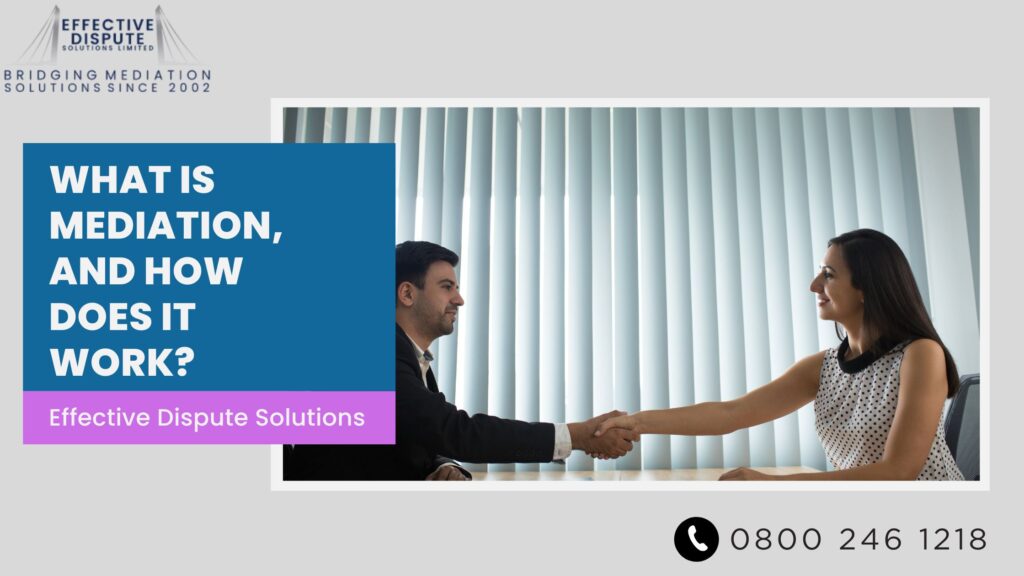
When you find yourself in a disagreement, whether at work, at home, or in business, it can feel overwhelming. Arguments drag on, stress builds, and sometimes, it seems like there’s no way out except going to court. But what if there was a better, faster, and friendlier way to resolve disputes? That’s where mediation comes in.
Understanding Mediation: A Simple Explanation
So, what is mediation? Mediation is a way for people who disagree to come together and talk things out with the help of a neutral third person called a mediator. The mediator doesn’t take sides or make decisions for you. Instead, they guide the conversation, help everyone share their side, and work towards a solution that everyone can accept.
Think of the mediator as a referee, umpire or chair person. They keep things fair, make sure everyone gets a turn to speak, and help those present stick to the rules. But they don’t decide who wins or loses. The goal is to reach an agreement that works for everyone.
Why Choose Mediation?
Let’s face it, court battles are expensive, stressful, and can take years to settle. Mediation, on the other hand, is:
- Faster: Many disputes can be resolved in just one day, often within 14 days of contacting a mediator.
- Cheaper: You save on legal fees, court costs, and expert witnesses. That’s money you can spend on things you love instead of arguments.
- Less Stressful: No judges, no cross-examinations, and no public drama. Mediation is private and confidential, so you can speak freely without worrying about others finding out.
- Convenient: Mediators can travel to you or mediate for you online, making it easy no matter where you are.
- Flexible: Mediation can be used for all sorts of disputes, workplace issues, family disagreements, business conflicts, B2B, B2C as well as boundary disputes.
How Does Mediation Work?
You might be wondering, how does mediation work in practice? The mediation process is designed to be clear and straightforward, even if the problem feels complicated.
The Mediation Process Steps
Here’s a breakdown of the typical steps involved in a mediation:
- Initial Contact and Agreement
- You reach out to a mediation service, explain your dispute, they quote you and then you agree for them to provide your mediation.
- The mediator explains how things will work and answers your questions.
- Pre-Mediation Preparation
- Each party to the dispute will provide the mediator with their version of the dispute. If court action has started, this will usually be a copy of the pleadings (court documents submitted to the court).
- If the dispute is not subject to court action, or is a workplace dispute then the mediator will typically ask for a position statement. Whereby those in dispute set out what has happened and what needs to be addressed.
- Prior to the mediation the mediator will read through any documents so that they are clear on all the issues between the parties.
- Opening Joint Session
- All the parties come together (in person, via Zoom, or over the telephone).
- The mediator introduces everyone, explains the mediation process, clarifies their role and the rules, setting the tone for a respectful series of joint and private discussions.
- Sharing Perspectives
- Each party / employee / person gets a chance to explain their view without interruption. Which would typically start with their position statement.
- The mediator listens and makes sure everyone feels heard and that they engage with the process when required to.
- At some point the mediator will have private meetings with the participants. This can be immediately after the first opening joint session, shortly after, or when the mediator feels is the best time to do so.
- Private Discussions (Caucus)
- The mediator will meet with each side separately at some point.
- This gives the parties a safe space to share their thoughts, concerns, and ideas privately.
- Identifying Issues and Generating Options
- The mediator helps, guides everyone to identify the issues that are, and are not in dispute.
- Through open and honest dialogue together, leads to discussing and considering possible solutions.
- Negotiation and Bargaining
- The mediator guides the parties (jointly and separately) to discuss options and work toward a solution.
- This usually involves the mediator going back and forth between the parties until common ground is found.
- Reaching Agreement
- Once an agreement has been achieved, the mediator helps the parties to record the same in writing.
- Once the parties sign any agreement they have made, it will become legally binding if it is a civil or commercial matter. If it is a workplace dispute then it is not legally binding, but an agreement in good faith / on trust.
- Post The Mediation
- Once the mediation takes place. That generally is an end to the mediator’s role. Only in workplace disputes, where an agreement has been achieved should the mediator check in to see how things have progressed. This would typically be after three to six months of the mediation taking place.
What Does the Mediator Do?
You might ask, what does a mediator do exactly? The mediator’s main role is to help you talk and negotiate. They:
- Stay neutral, and don’t take sides.
- Keep the conversation respectful and focused.
- Help everyone understand each other’s point of view.
- Suggest ways to move forward but never force a decision.
- Make sure everything stays confidential, what is said or done at a mediation must remain confidential. The whole process is without prejudice.
When Should Someone Consider Mediation?
Mediation is a good choice in many situations, including:
- When you want to resolve a dispute of any nature quickly and privately.
- If you want to save money and avoid long court and employment tribunal battles.
- When you need to preserve / keep a relationship going, like with a work colleague, a neighbour, business to business or with a family member.
- If you feel stuck and need help finding a solution, that everyone can accept and live with.
- When you want to retain control over the outcome instead of leaving it up to a judge or an arbitrator to impose a decision / judgement / award on you.
How Effective is Mediation in Resolving Disputes?
Mediation is highly effective. Most people who try mediation reach an agreement they can accept and live with. It works because it gives everyone a voice and focuses on finding solutions, rather than just arguing about the issues. Moving people from dwelling on the past and into the future.
Types of Disputes Mediation Can Help With
At Effective Dispute Solutions, we are proud to say our mediation services span across all sectors. We cover everything. It is easier to say what we have not mediated, than what we have. Our practice covers every type of dispute, such as:
- Civil and Commercial Disputes: Business contracts, professional disagreements, property, landlord and tenant, building and construction issues.
- Workplace and Employment Disputes: Bullying, discrimination, grievance and disciplinary disputes. Employment conditions, pay, contracts, job description and so forth.
- Family Disputes: Loans, probate, wills and inheritance. Money, property, land, family businesses.
- Boundary and Neighbour Disputes: Problems with boundary encroachment, shared access, party walls, fences, noise, or shared spaces.
- Online and Telephone Mediation: Perfect for those who prefer remote meetings or can’t travel.
No matter the problem, mediation offers a confidential resolution process that puts you back in control.
Benefits of Mediation: Why It’s the Smart Choice
Let’s recap the main benefits:
- Saves Money: No expensive court fees or solicitor bills.
- Saves Time: Most disputes are resolved in 4-8 hours, not months or years.
- Reduces Stress: No courtroom drama, just calm, guided conversation.
- Convenient: In-person, online, or over the telephone, whatever works best for you.
- Confidential: Your business stays private.
- Flexible: You decide the outcome, not a judge or an arbitrator.
Tips for a Successful Mediation
- Be Open: Come ready to listen and share your perspective honestly.
- Stay Respectful: Even if you disagree, keep things polite.
- Think About Solutions: Focus on what you want to achieve, not just what went wrong.
- Trust the Process: The mediator is there to help, not judge.
- Remember the Goal: It’s about finding a solution everyone can live with.
Ready to Resolve Your Dispute?
If you’re facing a disagreement and want a quick, affordable, and private solution, mediation could be the answer. At Effective Dispute Solutions, our experienced team of expert mediators can help you resolve your dispute, often within just one day.
We offer mediator services across the UK, in person, online, or over the telephone. Let us save you time, money, and stress so you can get back to what matters most.
Contact us today for a free consultation and discover how mediation can work for you.
For more information about our mediation services and how we can help, visit our website or give us a call. Let’s find your solution together.

